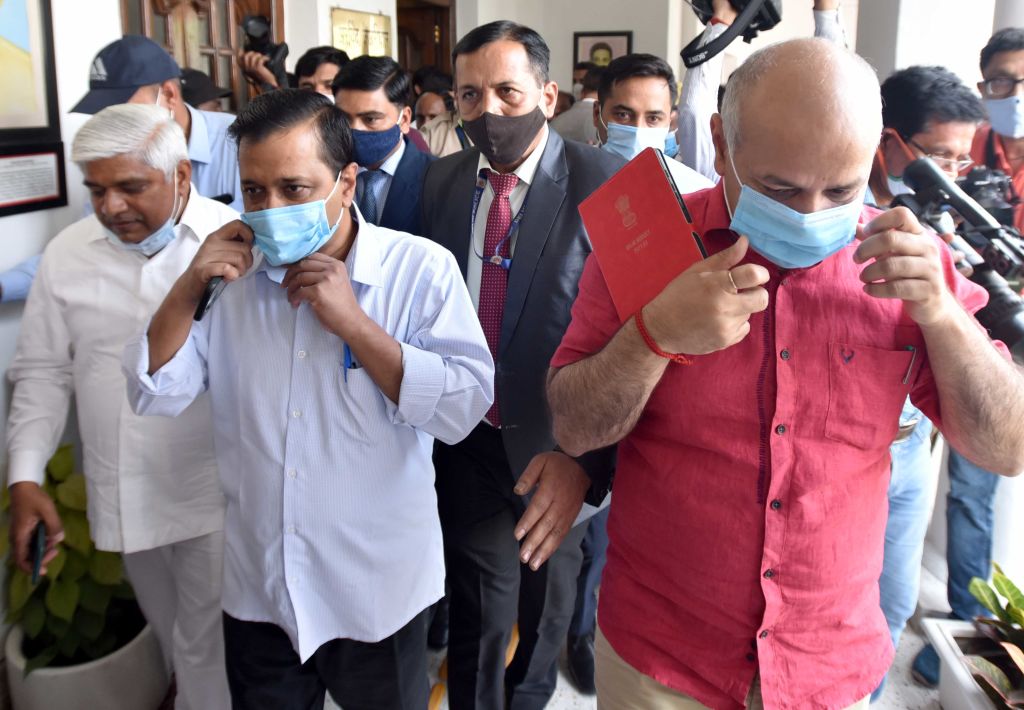
Delhi deputy Chief Minister, Manish Sisodia presented the state budget on 9 March PHOTO: Getty
In his budget speech Delhi’s Finance minister, Manish Sisodia raised the issue of the rising levels of pollution since independence and said the budget shows his government’s willingness to “put an end to environmental pollution”. Sisodia said that the AAP government has taken several steps like banning of single use plastics, better management of wastewater, prohibiting the practice of burning garbage and leaves in the open, shutting down of thermal power plants, encouraging the use of bio-decomposers made by agricultural scientists of Pusa to prevent pollutants, deploying mechanical road sweepers and also steps to extend green cover of Delhi.
While presenting the budget, Sisodia, put forth an ambitious plan of shifting the entire transport system to electric vehicles in the next 25 years.
In August 2020, Delhi government approved the Delhi Electric Vehicle policy 2020 with an aim to establish Delhi as the EV capital of India especially in the categories of two-wheelers, public transport vehicles and good carriers.
Sisodia said, “Prior to this policy, the total number of electric vehicles in the newly purchased vehicles in Delhi was 0.2%. Post the policy launch, 7000 new electric vehicles have been purchased in Delhi. If we compare the figures of the last 3 months, 2,621 electric vehicles were purchased out of a total of 1,18,482 newly purchased vehicles.”
Giving credit to his government, he said that the share of electric vehicles has increased from 0.2% to 2.21%. And set a target for his government “by 2024, 25% of new registered vehicles will be electric vehicles”. He called Delhi, the first city in India that has waived road tax and registration fees and also given maximum subsidy for all types of electric vehicles.
Currently, there are 72 functional public charging stations for electric vehicles in Delhi. Soon this number will reach 500. In this regard, rapid charging points are also being built along the lines of the city of London. “We aim to have at least one e-charging station every 3 kilometers in Delhi. We sincerely hope that when the country is celebrating its 100th Independence Day, our Delhi will be 100% free from vehicular pollution.” he said.
Talking about e vehicles in public transport, he said that his government is preparing to bring 1,300 e-buses on the roads. And for 300 DTC’s e-buses tender has been put in place, they will hit the roads by December this year. Sisodia promised that 1,000 new e-buses will be on the roads by the middle of next year under the cluster scheme.
Sisodia in last year’s budget talked about Delhi government’s aim to reduce pollution by two third in next five years. But this year, this point didn’t find mention.
Last year, he also promised to spend 20 crore for creating awareness about environmental issues like segregation of waste at home, avoiding single use plastic, rooftop plantation, gifting plants instead of offering bouquets, use of public transportation and car pooling, cycling for short distance, using jute and cloth bags, preventing waste of paper, to celebrate in eco friendly ways and holding conferences on environmental issues etc. But this year he did not allocate money for this.
In this year’s budget, he said the Delhi government has made it compulsory to install anti-smog guns at construction sites. And “the installation of two anti-smog towers is in its final stage.” Smog towers are designed to work as large-scale air purifiers. Multiple layers of air filters, which clean the air of pollutants as it passes through them are fitted in them.
In November 2019, the Supreme Court had directed the Centre and State governments to install smog towers to tackle air pollution.
Sisodia also said that his government is working in collaboration with IIT Delhi and Kanpur to implement real time assessment of air, water and land pollution.
However, Sisodia did not announce any policy or plan to tackle air pollution.
Manish Sisodia said that the Yamuna can be cleaned completely within the next three years. He, however, did not suggest any road map, or separate policy for it. He thinks that Delhi’s interceptor sewer project ISP would help clean the Yamuna.
The ISP will trap sewage water and send it to the nearest Sewage Treatment Plant for treatment, before being discharged into drains after collecting from 108 sub-drains of three major drains — Najafgarh, Shahdara and Supplementary.
“Interceptor sewer project work is also nearly 99% completed. With the help of STP and Interceptor, the Yamuna can now be cleaned completely within the next three years,” he said.
On the principle of 'Sarvajan Hitaya, Sarvajan Sukhaya' -- Welfare for all, Happiness for all…
With hundreds reported missing in Delhi this year, this guide explains how families can use…
The case came to light after a 35-year-old woman from Panipat alleged that she had…
During the investigation, CCTV footage helped identify the suspects, according to Delhi Police
The launch took place during the inauguration of the Delhi Police Exhibition Hall at Connaught…
The 28-year-old factory owner was taken to Satyawadi Raja Harish Chandra Hospital in Delhi, while…